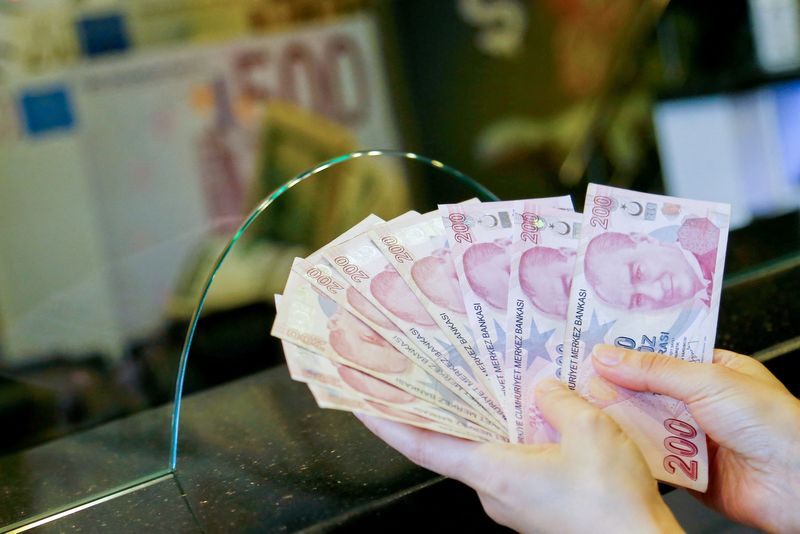By Tuvan Gumrukcu and Nevzat Devranoglu
ANKARA (Reuters) - The Turkish currency was highly volatile again on Tuesday as traders digested measures proposed by President Tayyip Erdogan and the Turkish central bank to guard local currency savings against precisely such swings.
The lira
One-month implied volatility on the lira, or expected price swings, jumped to the highest on record, reflecting uncertainty about the scheme.
On Tuesday, the Turkish central bank said it will support the conversion of foreign currency deposit accounts into lira deposit accounts to further encourage reverse dollarization.
"In the event that resident real persons, who already had an FX deposit account ... convert their accounts into Turkish lira time deposit accounts will be eligible to benefit from the incentive," the central bank said.
More than half of locals' savings is in foreign currencies and gold, according to central bank data, due to a loss of confidence in the lira after years of depreciation. At its low, the lira was down some 60% on the year.
Erdogan introduced a series of steps on Monday that would shift the burden of a weakened currency to the Treasury and encourage Turks to hold lira rather than dollars. [nL1N2T616D]
The government's initial support for the currency sent the lira soaring some 25% on Monday, albeit in the lowest volume of trading for any day so far this year.
Analysts and bankers warned that if the lira's rally reverses it could further stoke already high inflation and weigh on the deficit.
"Our back-of-the-envelope calculation shows that any extra 12% lira depreciation over the lira interest rate could increase the budget deficit by around 1% of GDP over a six-month horizon," said JPMorgan (NYSE:JPM) analysts in a note.
Finance Minister Nureddin Nebati said on Tuesday that legal proceedings against speculative market comments made on social media were initiated after the recent currency volatility.
"We will never allow such treason," he said.
A source with knowledge of the matter said the Monday measures were decided after the exchange rate hit "problematic" levels, adding that the government would manage the coming period carefully.
"The dollar and euro had risen up to the point of forming a bubble, really. This needed to be intervened in. This situation was not sustainable," the person said, requesting anonymity.
Turkey's five-year credit default swaps, the cost of insuring against a sovereign default, were at 604 basis points after hitting on Monday 622 bps, the highest since May 2020, according to IHS Markit.
Graphic:Lira volatility hits record hit-https://fingfx.thomsonreuters.com/gfx/mkt/gdpzymlxkvw/Pasted%20image%201640076530130.png
WEAKENED BACKDROP
Presidential adviser Cemil Ertem told Reuters the moves had removed the need for individual investors' dollar demand, adding it was "a very important paradigm shift" for Turkey's economy.
While the government called the lira's rebound on Monday a major win on policy, economists have said Erdogan's economic program based on low interest rates is reckless and expect inflation, currently above 21%, to blow through 30% next year.
Turkey's main BIST 100 stock index fell 8% on Tuesday.
Under pressure from Erdogan, the central bank has cut rates by 500 basis points since September. The president has pledged to continue with his low-rates policy.

"The market may be waiting to see how this exchange rate guarantee may play out," said Gary Schlossberg, global strategist at Wells Fargo (NYSE:WFC) Investment Institute in San Francisco.
"Some people think it will stabilize the market for a time, but it just seems that the fundamental backdrop is weak and I'm not sure how long that measure by itself can shore up the market."